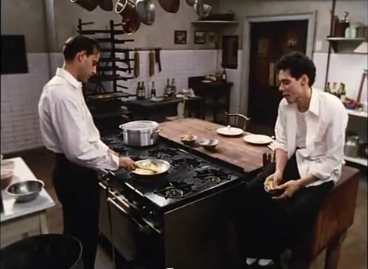
BIG NIGHT (1996, Tucci/Scott)
Big Night is a lovely ‘play’ of a movie – small, contained, self-aware and full of charming and nuanced performances. Ian Holm is spastically delightful, and the comic moments from the whole cast often play quietly and powerfully. Two of the actors in the film, Stanley Tucci and Campbell Scott, direct, and they have a particular love for the long master shot – letting the actors deliver the story in a way that Stanley Donen would let Gene Kelly deliver the dance moves, from head-to-toe and uninterrupted. Hurray!
The movie is about the artistry of fine food as it’s both undermined and defended from crass commercialism. It’s interesting that the staging and the photography of the cooking and the banquet tables are shot with such classic artistry. (Compare that to the near verite craziness of the base and successful eatery across the street, Ian Holm’s joint.)
Tucci & Scott’s silent movie moment
So that brings us to the simplicity of the final shot. The two brothers, played by Tucci and Tony Shalhoub, have always been joined at the hip, and their dreams of a fine restaurant have crumbled, as has, perhaps, their unhealthy co-dependance on each other. Even though the last time we saw them they were embroiled in a violent and heated argument (though even the violence was funny), the two are incapable of having anything less than affection for each other. And this scene brings them back together, though changed, in the one place they are truly meant to be – in the kitchen with food (though the menu has been hugely simplified, a nice metaphor). What makes this scene so beautiful is its loaded silence and that it unfolds so naturally in real time. (That’s Marc Anthony, playing more or less the bus boy, sleeping on the counter.)
This is the lovely final scene –
Torsloke
It speaks so strongly to the characters’ histories. Food had driven them apart, but it’s food that brings them back together. The audience knows this is a scene that has replayed itself countless times in the family’s past, food as an expression of love, salving the wounds of life’s inequities. So evocative too that it’s the younger brother (reinforced wonderfully by naming them Secundo and Primo) who initiates the reconciliation, taking care of his older brother as surely Primo has taken care of him.